Exclusive Franz Tost Q&A: FP1 sessions planned for Verstappen
Toro Rosso unexpectedly hit the headlines earlier this week when they announced that Dutch youngster Max Verstappen - currently just 16 - will be racing for them next year, joining the almost-as-youthful Daniil Kvyat, the Russian rookie currently enjoying a successful first season with the Red Bull-owned squad. We caught up with team principal Franz Tost in Belgium on Thursday to discover more about the unusual decision…
Q: Franz, the Verstappen announcement came like a big bang, pulling everybody out of their contemplative holiday mood. Why now - why so early?
Franz Tost: Red Bull and (their motorsport consultant) Dr Marko have been in contact with Max for a long time. The contract was signed last week so it made sense to announce it now because in Formula One you can’t keep anything a secret for a long time. People talk. So it was the absolutely correct decision from Red Bull to announce it so early to kill all the speculation. Otherwise we would have had to deny it - and it was never our style to deny something that everybody already knows.
Q: A 17-year-old boy - does that make sense? And if so, what kind of sense? Yes, he has shown huge talent in F3, but his age speaks against such a move. Is he ready?
FT: It will be one of the jobs of Toro Rosso to make him ready. Right now he is 16 years-old on paper, but for me he is much more mature than these 16 years - and from his driving abilities he is even more mature. I am absolutely convinced that we can bring him to a level where he will have success.
Q: Gerhard Berger once said of the young Sebastian Vettel that he looked like a boy but acted like a 30 year-old. Is Max in the same mold?
FT: I have to get to know him better, but from what I have seen and know from our meeting he is definitely much older than these 16 years on paper.
Q: It looks like Red Bull is going for records again. First the youngest world champion ever and now the youngest driver ever. Are you happy with this development?
FT: Yes, because they are successful. Don’t forget, Max Verstappen is coming from the fourth karting generation. The first kart generation were drivers of the Alain Prost’s generation, which means that they did some racing in summer time. The second generation was Ayrton Senna and Michael Schumacher. They also did some races in wintertime. The third was the period with Vettel, Rosberg and Hamilton. They did many more races. And now we have the fourth generation: they even have school at the race tracks. That means they have such a high level of driving abilities that we are talking here of a completely new generation of drivers. Having that in mind, we have to rethink the future. In the past you had to have a driver’s license - meaning being 18 years-old - to drive a normal racing car, so in those days a driver started at 18. But now these kids start at six or seven, so they already have ten years’ race experience - translated to the ‘old days’ that would mean 28 years. So we do have a completely different time frame. So as the peak of motorsport we also have to rethink. We can’t just say these guys are too young. In their driving abilities they are far ahead, so we have to adjust to that talent.
Q: Will we see mobile schools traveling with the F1 paddock to meet the needs of these teenagers?
FT: Ha, maybe!
Q: Who was the driving force behind Verstappen’s signing? Whose decision was it?
FT: Red Bull with Dr Helmut Marko.
Q: You always had a high opinion of Jean-Eric Vergne. How is it seeing him go?
FT: Jean-Eric is a real high-skilled driver and I am convinced that if he stays in F1 he will have success because he has the abilities to win races. I hope that he will get another seat. He has been with Toro Rosso for three years now and I hope that he has learned a lot. The origin of Toro Rosso is about nurturing young talents - that was why this team was built. After three years you are no longer a young driver, but nevertheless Jean-Eric is a very good driver and I hope he gets the chance in F1 to show his skills.
Q: Last year you said that both Daniel Ricciardo and Jean-Eric were on the same level and that it was only Daniel’s slightly superior experience that made the difference in signing him for Red Bull Racing. Now one of the two talented youngsters is en route to becoming a regular race winner - and the other is quite possibly out of the sport? Did Jean-Eric not develop in recent months as you would have wanted…
FT: He did develop. Unfortunately we didn’t have the car that we wanted. We had a lot of reliability issues with the engine and also the team did not provide him with a car he would have deserved to show how good he is. But the season is not over yet. We had dinner together yesterday evening and I told him that we will do anything so that he can show that he deserves a seat in F1.
Q: What will that mean for the team? The aim recently seems to have been to establish Toro Rosso as a midfield team, and abandon the ‘rookie camp’ idea. Is that now the end of that dream - racing with one driver in his second year and the other a real teenager?
FT: Yes, because Toro Rosso has not to become a midfield team but a frontrunner team! And with the youngsters. There is no excuse. With Daniil (Kvyat) and Max we have two super talents in our cars. We just have to provide them with a proper car, a reliable car, and a fast car. I promise that we will bring in good results and that both will surprise some people. I am sure these two are the correct drivers for us.
Q: Will it help Max that he has such close connections to the racing world through his father?
FT: For sure. He grew up at the race tracks, so he is not surprised about anything - for him nothing in the paddock is new. He had the experiences of the paddock from the past, with the only difference that now it is transferred to his person. So he will manage all the workload from the driving side, from the technical side, from the press and the marketing side.
Q: What about you? Every time you get a new driver to mold he is younger than the one before. One day you will end up in kindergarten…
FT: For me it’s fantastic! (laughs) For me only the relationship that really matters is the one between the right-hand pedal and the driver. This is most important - I don’t care about the age. It’s all about the performance a person is able to bring. Of course it is more work for the team to educate a young driver. You have to take care about the physical training, about the nutrition, about the marketing and press - and very importantly to work with the engineers. That means you have to find the correct balance for all these different topics. They are probably more high-maintenance.
Q: Coming back to the 2014 season, you are in P7 - will that last? Can you keep Lotus behind?
FT: I hope so, yes. We also hope to close the gap to the teams that are in front of us - which will be tricky at the next two races as Spa and Monza at ‘engine races’, but nevertheless you have to be prepared as Spa especially is very unpredictable. So in the end we are convinced that we can keep Lotus behind us.
Q: Daniil Kvyat is doing very well. Was that a factor in your decision to take on a youngster like Verstappen - knowing that at least one driver has proved he is able to score?
FT: No, that was never decisive. What is decisive for us is how a driver is doing in the course of the season. Take for example Kvyat: last year in GP3 he drove some fantastic races where you could see how well he controlled the environment of his competitors. Overview is a very important point - always to use the right tools for a specific situation and never rely on what worked on the last lap working again on this lap. Being flexible in your strategy to go about things - that’s what really makes the difference. And Max is of the same mold. When he jumped into Formula Three he immediately was in front. From 27 races he has won eight races and he has been in the top five 17 times - if that is not impressive… Take the Norisring race - a very short track with a 50-seconds lap time: he was 1.5 seconds faster than the rest. And then when you looked at his driving style - so smooth, so controlled - then you have no difficulties bringing him into F1 now. These are drivers that are no passengers in their cars - they control their cars and their environment around them. Max probably will have some problems at the beginning of the 2015 season - because the first few races are always difficult, especially if you don’t know the tracks - but after a couple of races you will see that Max is in the points.
Q: What is the first thing that you will teach him?
FT: We had a meeting this afternoon as another ‘get to know each other’ get-together. Next week he will come to Faenza to get to know the factory and have a seat made for him. Hopefully he gets his super license soon and then we will run him in FP1 sessions to give him the feeling - and he will run the test in Abu Dhabi after the race. The wintertime will be very intense with training and more of a technical schooling - and then he will jump into the car in Melbourne and will drive it like a Formula Three car.
Next Up
Related Articles
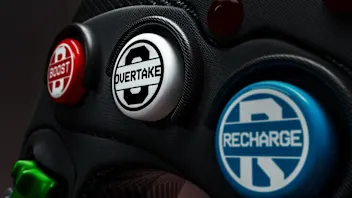 EXPLAINED: The key terms for F1’s new-for-2026 rules
EXPLAINED: The key terms for F1’s new-for-2026 rules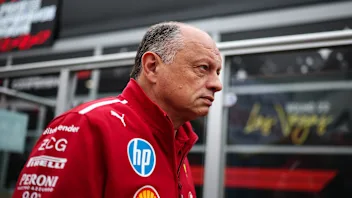 Vasseur says he misjudged impact of switching focus to 2026
Vasseur says he misjudged impact of switching focus to 2026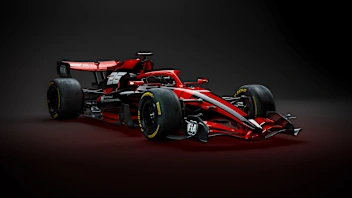 GALLERY: Check out renders of the innovative 2026 car
GALLERY: Check out renders of the innovative 2026 car ‘I have achieved my dream, that little boy's dream’ – Norris
‘I have achieved my dream, that little boy's dream’ – Norris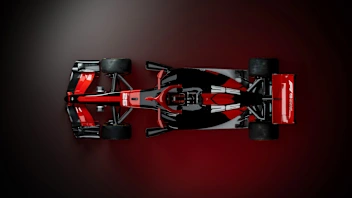 Everything you need to know about F1's new rules for 2026
Everything you need to know about F1's new rules for 2026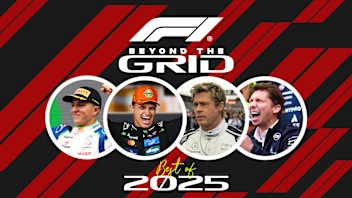 Beyond The GridThe best of 2025, from Norris’ evolution to Brad Pitt’s ‘need for speed’
Beyond The GridThe best of 2025, from Norris’ evolution to Brad Pitt’s ‘need for speed’